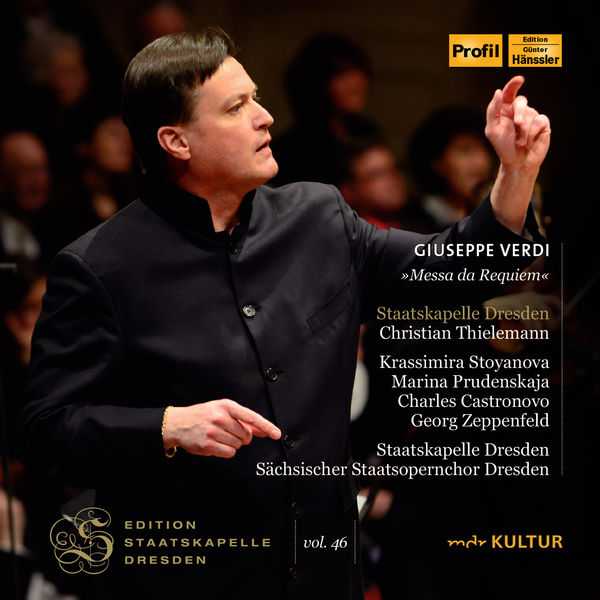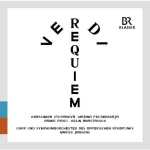
Composer: Giuseppe Verdi
Performer: Krassimira Stoyanova, Marina Prudenskaja, Charles Castronovo, Georg Zeppenfeld, Krassimira Prudenskaja, Sächsischer Staatsopernchor Dresden
Orchestra: Staatskapelle Dresden
Conductor: Christian Thielemann
Number of Discs: 2
Format: FLAC (tracks)
Label: Profil Medien
Catalogue: PH16075
Release: 2019
Size: 336 MB
Recovery: +3%
Scan: yes
Messa da requiem
CD 01
01. Requiem Sequentia
02. Dies irae
03. Tuba mirum
04. Liber scriptus
05. Quid sum miser
06. Rex tremendae
07. Recordare
08. Ingemisco
09. Confutatis
10. Lacrymosa
CD 02
01. Offertorium – Domine, Jesu Christe
02. Offertorium – Hostias
03. Sanctus
04. Agnus Dei
05. Lux aeterna
06. Libera me
The Verdi Requiem in Memory of the Destruction of Dresden on February 13, 1945 The Requiem concerts of the Dresden Staatskapelle on Dresden Memorial Day maintain a long tradition. It is 68 years now since February 13, 1951, when Rudolf Kempe, at that time General Music Director of the Dresden Staatsoper and Principal Conductor of the Dresden Staatskapelle, conducted the Messa da Requiem by Giuseppe Verdi, the first Requiem to be performed on this day in remembrance of the bombing of Dresden in February 1945, during which many thousands perished within the space of a few hours and large parts of the city were destroyed. The effects of the war were everywhere to be seen in Dresden in 1951; heaps of rubble dominated the city. The presentation of the Verdi Requiem in the Large Auditorium of the Staatstheater – the present-day Schauspielhaus – left a deep impression on those present, who listened in awed silence.
You hesitate to assign national characteristics to musical performances. After all, Arturo Toscanini was noted as both a Wagnerian and a Brahmsian. Yet, this big reading of Verdi’s Requiem by Christian Thielemann, leading the Staatskapelle Dresden and Sächsischer Staatsopernchor Dresden arguably qualifies as Germanic. It doesn’t conform to von Bülow’s dictum that the Requiem was merely an opera in sacred garb. If anything, Thielemann makes a German symphony out of it, with all its elements in balance. You can find more purely Verdian readings, but there is much to recommend in this live recording, made during an annual commemoration of the destruction of Dresden in 1945, at which Verdi’s, and other requiem masses are performed. The lack of applause at the end was not accomplished through engineering, but is traditional. Start with the particular strengths of the Staatskapelle Dresden, whose brass section, especially since the ascent of Thielemann to the podium, is perhaps the best in Europe. Sample the famed Dies irae, and hear how its sweeping power comes from the way Thielemann is able to shape what the brass are doing. The flipside are the solo movements, ably handled here by a set of vocalists who remain under Thielemann’s control. Profil’s engineers contribute greatly: they are willing to tolerate a slight loss of clarity to bring you into the midst of this uniquely muscular reading of this work, and the overall effect is powerful indeed. Not the last word on the Verdi Requiem, but certainly a reading that demands to be heard.



